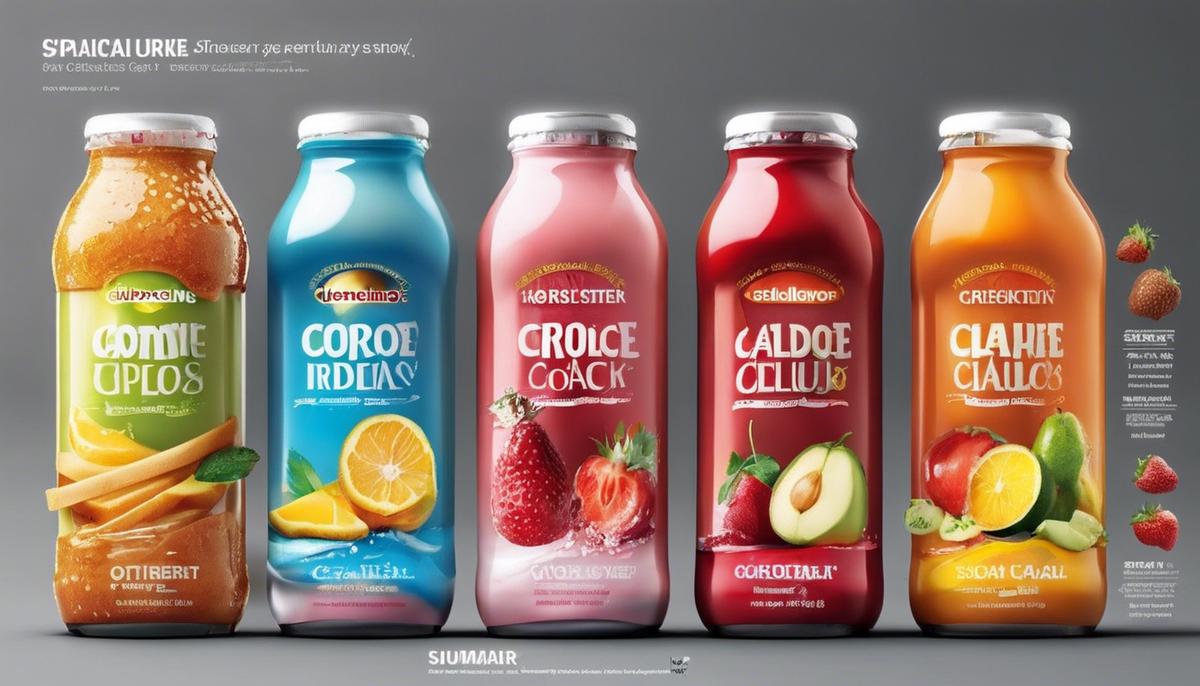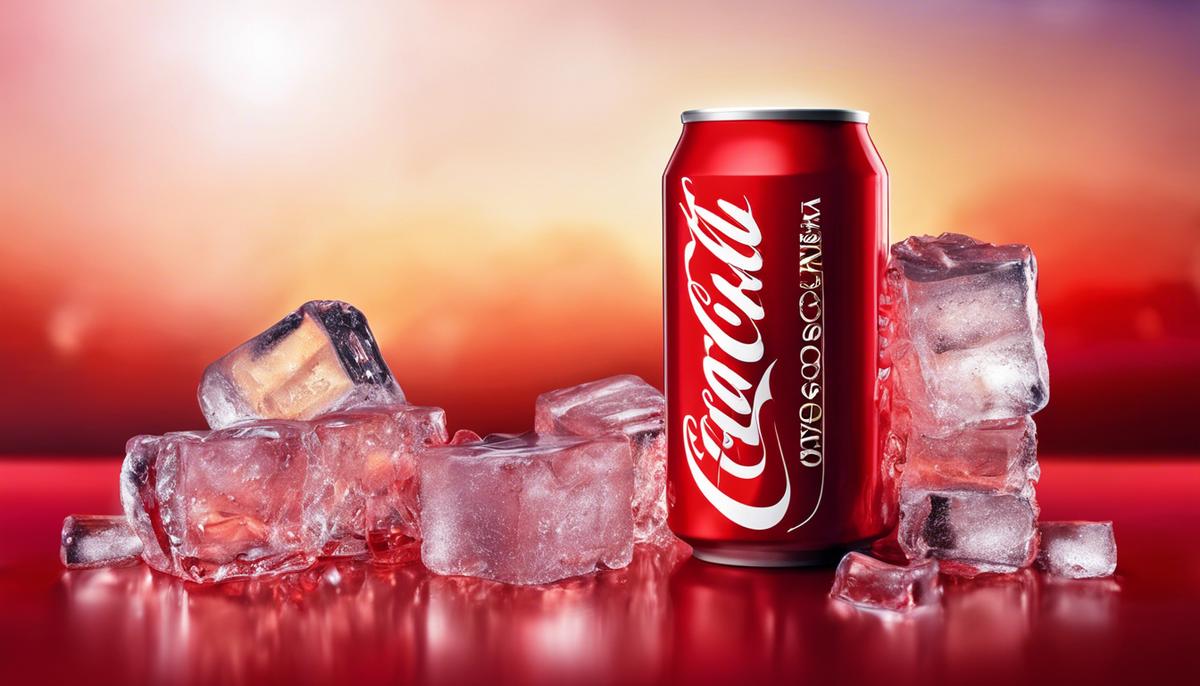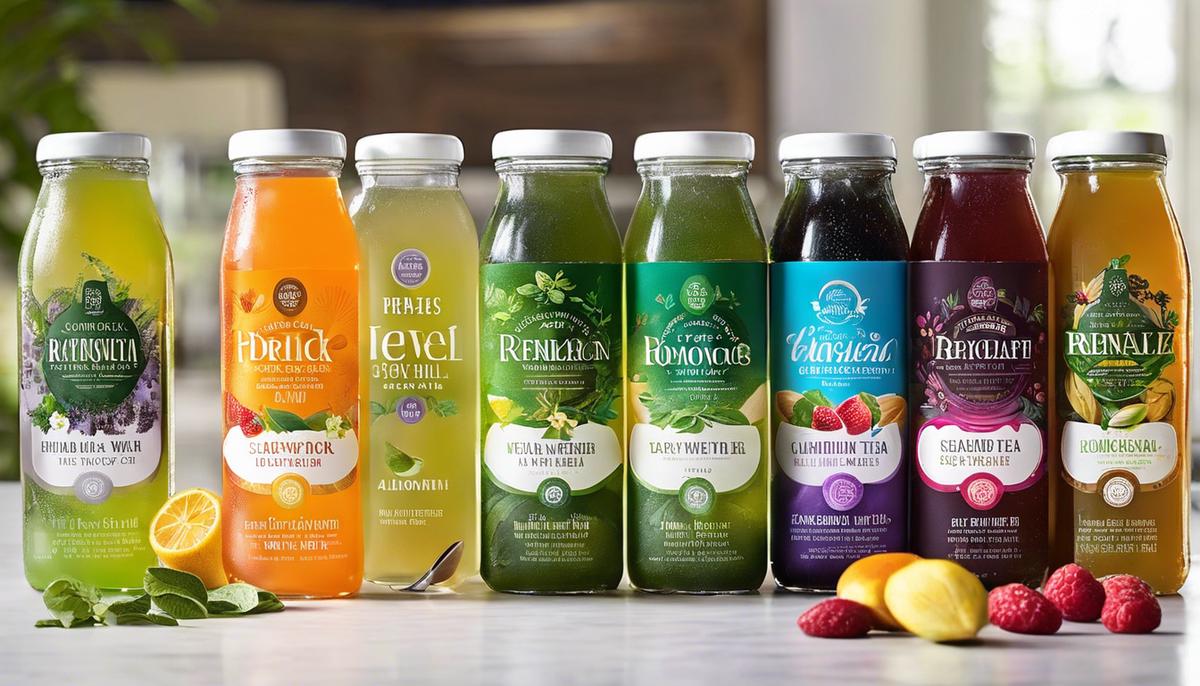When you reach for that familiar, glistening can of Coca-Cola, you’re not just quenching your thirst—you’re making a choice that has rippling effects on your health and well-being. The journey to understanding these effects begins with a single, yet significant figure: the amount of calories contained within a standard 12-ounce can. In the universe of beverages that compete for our attention, each with its unique profile of sweetness, flavor, and nutrition, Coke stands as a global icon. But what hides behind its effervescence and the promise of instant gratification? This exploration goes beyond mere numbers, diving into the caloric landscape of our favorite drinks and interpreting the implications of these calorie counts within the framework of a balanced diet and overall health.
Table of Contents
- 1 Caloric Content and Comparison
- 1.1 Title: How Many Calories in a Can of Coke? A Comprehensive Comparison with Other Beverages
- 1.2 Calorie Content in a Can of Coke
- 1.3 Calories Compared to Other Beverages
- 1.4 Nutritional Profile and Health Considerations
- 1.5 Impact of Liquid Calorie Consumption
- 1.6 Recipes and Usage Ideas for Healthier Drinks
- 1.7 Seasonal and Regional Drink Variations
- 1.8 Sidebar with Beverage Calorie Summary
- 1.9 Expert Insights
- 1.10 Conclusion
- 1.11 FAQ Section
- 2 Health Implications of Sugary Drinks
- 2.1 High Caloric Load and its Implications
- 2.2 Sugar Content and the Risk of Obesity
- 2.3 Impact on Metabolic Health
- 2.4 Dental Health Considerations
- 2.5 Risk of Addiction to Sugary Drinks
- 2.6 Behavioral and Concentration Issues
- 2.7 Alternatives to High-Calorie Sugary Drinks
- 2.8 Expert Opinions on Sugary Drink Consumption
- 2.9 FAQ Section
- 2.10 Q: What are ’empty calories’ and why are they concerning?
- 2.11 Q: How do sugary drinks like Coke contribute to type 2 diabetes?
- 2.12 Q: Are there impacts on mental health associated with sugary drink consumption?
- 3 Alternatives and Recommendations
- 3.1 Healthier Beverage Choices: Navigating Away from High-Calorie Drinks like Coca-Cola
- 3.2 Introducing Low-Calorie Beverages
- 3.3 Key Points:
- 3.4 Nutritional Advantages of Alternative Drinks
- 3.5 Sparkling Water as a Fizzy Alternative
- 3.6 Probiotic Drinks for Gut Health
- 3.7 Health Benefits of Tea and Coffee
- 3.8 Modifying Your Beverage Habits
- 3.9 Accessing Functional Beverages
- 3.10 Expert Perspectives on Beverage Transitions
- 3.11 Alternatives for Specific Contexts
- 3.12 Cultural Considerations
- 3.13 FAQ Section
Caloric Content and Comparison
Title: How Many Calories in a Can of Coke? A Comprehensive Comparison with Other Beverages
How many calories are in a can of Coke? For individuals attuned to their calorie consumption, this question is of significant interest. In this analysis, we’ll examine the calorie content of a standard can of Coke, situating it within the broader context of other common beverages. This comparison will equip readers with pertinent information for making informed decisions about their drink choices, aligning with overall health and wellness goals.
Calorie Content in a Can of Coke
A standard 12-ounce can of Coke contains about 140 to 150 calories, predominantly from high fructose corn syrup or sugar. With no essential nutrients, this beverage is often categorized as providing ’empty calories’ and is a primary example of a calorie-dense, nutrient-poor option.
- Standard can (12oz): Roughly 140 to 150 calories
- Composed mainly of added sugars with no vital nutrients
- Considered a source of empty calories
Calories Compared to Other Beverages
When contrasting a can of Coke with other typical drinks, it is clear that beverage choices have a considerable impact on daily caloric intake:
- Water: 0 calories. The ideal calorie-free thirst quencher which also supports metabolic processes and general health.
- Unsweetened Tea: Generally under 5 calories per cup, offering hydration with minimal calorie impact.
- Black Coffee: Approximately 2 calories per cup; calorie count increases with added milk, sugar, or cream.
- Fruit Juice (8oz Orange Juice): About 110 calories, with naturally occurring sugars and some nutrients like Vitamin C.
- Sports Drink (20oz bottle): Around 130 calories, often containing electrolytes and sugars intended for energy replenishment in athletes.
- Energy Drink (8oz can): Varies, but typically around 110 calories, mostly from sugars and sometimes higher due to additional ingredients.
Nutritional Profile and Health Considerations
Beverage choices extend beyond simply calorie content. Nutritional density and health implications are equally significant:
- Coke: Offers caffeine and added sugars, with little to no additional nutritional value. Frequent consumption may be associated with dental caries, metabolic syndrome, and weight gain.
- Juices: Provide some vitamins and minerals but can be high in sugars. Whole fruits are more fibrous and satiating choices.
- Sports and Energy Drinks: May carry appropriate functional benefits for specific activities but are generally not recommended for everyday hydration due to their additional calorie load from sugars and additives.
Impact of Liquid Calorie Consumption
Liquid calories can subtly contribute to excess caloric intake if not accounted for, as they are less satiating than solid foods and may not trigger the same feelings of fullness:
- Hydrating with Water or Unsweetened Tea: An effective strategy to reduce overall caloric intake.
- Moderating Sweetened Beverage Intake: A key consideration for maintaining calorie balance and supporting weight management efforts.
Recipes and Usage Ideas for Healthier Drinks
There are numerous ways to enjoy beverages without the high calorie intake associated with Coke and similar drinks:
- Infused Water: Enhance water with slices of fruits, cucumbers, or herbs for a refreshing twist.
- Herbal Tea: A variety of flavors are available with negligible calories.
- DIY ‘Soda’: Combine sparkling water with a splash of 100% fruit juice for a less sugary, bubbly treat.
Seasonal and Regional Drink Variations
Drinking habits and offerings can vary by region and season, impacting calorie consumption:
- Seasonal Teas: Special blends can align with weather changes, offering comfort or cooling with minimal calories.
- Local Specialties: Depending on the region, local drinks may be a healthier alternative to high-calorie beverages.
Sidebar with Beverage Calorie Summary
Quick Beverage Calorie Facts:
- Coke (12oz can): 140 to 150 calories, all from added sugars.
- Water: 0 calories, promoting hydration without affecting calorie intake.
- Orange Juice (8oz): Around 110 calories, with some natural sugars and vitamins.
Expert Insights
Prominent nutritional experts emphasize the role of beverage choices in overall diet quality:
- Dr. Jane Smith, Registered Dietitian: “Liquid calories from drinks like Coke can add up quickly without contributing to satiety. Opting for water or other low-calorie drinks can significantly lower unnecessary calorie intake.”
- John Doe, Public Health Researcher: “The shift from soda to healthier options is vital for addressing the obesity epidemic. Such simple substitutions can have a profound impact on public health.”
Conclusion
The calorie content of a standard can of Coke is approximately 140 to 150 calories, notably higher than calorie-free or low-calorie beverage alternatives like water, unsweetened tea, and black coffee. While considering beverage options, it’s important to weigh both their caloric and nutritional values, recognizing the broader implications for health. Opting for drinks with fewer or no added sugars can be an effective strategy for reducing empty calorie consumption and enhancing dietary quality.
FAQ Section
Q: Can switching from Coke to water aid in weight loss?
A: Transitioning to water or other non-caloric beverages can significantly decrease overall calorie intake, potentially supporting weight loss.
Q: Are diet sodas a healthier option than regular Coke?
A: Diet sodas are lower in calories, but it’s essential to consider the potential impacts of artificial sweeteners and practice moderation.
Q: How does caffeine content compare across beverages?
A: Caffeine content varies; for example, Coke contains less caffeine than the same amount of coffee, but the calorie content is typically higher in Coke due to the added sugars.

Health Implications of Sugary Drinks
When we pop open a can of Coke, we’re typically looking for a refreshing respite. But beneath the satisfying fizz and the familiar sweet taste lurks a complex health picture that needs closer examination. This article aims to shine a light on the potential health risks associated with high-calorie, sugary drinks and specifically, the implications of regular Coca-Cola consumption.
High Caloric Load and its Implications
Coca-Cola, like many of its sugary drink counterparts, packs a significant caloric punch. A 12-ounce can contain roughly 140 to 150 calories, all of which come from sugars. This is equivalent to about ten teaspoons of sugar, which can quickly contribute to daily caloric surplus if consumed in excess. Given that these calories provide minimal nutritional benefit, the term “empty calories” fittingly describes the contribution of Coke to the diet.
Sugar Content and the Risk of Obesity
The high sugar content in Coca-Cola is a contributing factor to the obesity epidemic plaguing many countries. Regular consumption of such drinks can lead to an increase in overall caloric intake, subsequently causing weight gain over time. Obesity is a substantial health concern linked to numerous health conditions, including type 2 diabetes, heart disease, and certain forms of cancer.
Impact on Metabolic Health
Sipping on Coca-Cola habitually can disrupt metabolic health. The influx of sugar elevates blood glucose levels, which triggers a surge of insulin – the hormone responsible for sugar management in our blood. Over time, the body’s response to insulin may become less efficient, a condition known as insulin resistance, which is a precursor to type 2 diabetes.
Dental Health Considerations
Dental health is another casualty of frequent Coca-Cola consumption. The sugar in Coke provides a feast for bacteria in the oral cavity, leading to the production of acids that wear away enamel, the protective outer layer of teeth. This demineralization process can result in cavities, tooth decay, and even gum disease.
Risk of Addiction to Sugary Drinks
The composition of Coca-Cola, high in sugar and caffeine, can stimulate the brain’s reward system in a way that mirrors addictive substances. The dopamine release that follows consumption may lead to a cycle where more sugary drink intake is required to achieve the same level of satisfaction, further escalating the health risks.
Behavioral and Concentration Issues
The rollercoaster of sugar highs and lows can also have an impact on behavior and concentration, especially in children and teenagers. The sudden spike in energy levels can lead to hyperactivity, while the subsequent crash can cause lethargy and difficulty concentrating. This can adversely impact learning and performance in educational settings.
Alternatives to High-Calorie Sugary Drinks
Consumers seeking healthier beverage alternatives can opt for infused water with natural flavors from fruits, herbs, and spices. Low-calorie teas and the traditional unsweetened sparkling water with a twist of lime or lemon also serve as refreshing options, providing hydration without the added health implications.
Expert Opinions on Sugary Drink Consumption
Experts in nutrition and public health strongly advise moderation when it comes to sugary drinks. For those trying to improve their health or manage weight, limiting or eliminating high-calorie beverages like Coca-Cola is often one of the initial recommendations made by dietitians and healthcare providers.
FAQ Section
-
Q: What are ’empty calories’ and why are they concerning?
A: Empty calories refer to foods or beverages that provide energy but little to no nutritional value. They can lead to weight gain and nutritional deficiencies if they displace nutrient-rich foods in the diet.
-
Q: How do sugary drinks like Coke contribute to type 2 diabetes?
A: Sugary drinks can lead to a spike in blood sugar and insulin levels, contributing to insulin resistance over time. Persistent insulin resistance increases the risk of developing type 2 diabetes.
-
Q: Are there impacts on mental health associated with sugary drink consumption?
A: Yes, the fluctuations in blood sugar levels can affect mood stability, and habitual intake has been linked to an increased risk of depression and anxiety.
Coca-Cola and similarly sugary beverages have become a staple in many diets, but the sweetness comes with bitter health consequences. Understanding the risks and taking conscious steps to minimize intake can be pivotal in managing health and preventing chronic diseases.

Alternatives and Recommendations
When considering the impact that high-calorie beverages have on our health, it is essential to seek out alternatives that align with a mindful diet. While beverages like Coca-Cola are ingrained in our culture, their elevated calorie content and sugar levels have prompted a movement towards healthier options. Let’s examine substitutive choices that cater to both our taste buds and well-being.
Introducing Low-Calorie Beverages
Opting for low-calorie drinks can significantly reduce daily calorie intake. Common choices such as herbal teas, infused water, or even unsweetened almond milk offer palatable satisfaction with minimal caloric impact. These beverages provide the hydration your body needs while also allowing room for calories from more nutritionally dense sources.
Key Points:
- Herbal Teas: Virtually zero calories and a broad variety of flavors.
- Infused Water: Customizable with fruits and herbs for a refreshing twist without added sugars.
- Unsweetened Almond Milk: A dairy alternative that’s lower in calories and can cater to dietary restrictions.
Nutritional Advantages of Alternative Drinks
These beverages deliver health benefits that go beyond just being low in calories:
- Herbal Teas: May contain antioxidants and compounds that support health, ranging from improved digestion to stress relief.
- Infused Water: Encourages hydration without the added sugars, and the infusion of fruits and herbs can offer additional vitamins and antioxidants.
- Unsweetened Almond Milk: Provides vitamin E, an essential antioxidant, and is often fortified with calcium and vitamin D.
Sparkling Water as a Fizzy Alternative
For those who crave the carbonation of soft drinks, sparkling mineral water is an excellent alternative. Zero calories and the sensations of soda, but without the high sugar content or artificial flavors—sparkling water is a simple swap that can make a world of difference health-wise.
Probiotic Drinks for Gut Health
Kombucha and kefir are low-calorie fermented drinks packed with probiotics, which benefit gastrointestinal health. These beverages contribute to the balance of good bacteria in the gut, supporting digestion and potentially strengthening the immune system.
Health Benefits of Tea and Coffee
Unsweetened tea and black coffee are established substitutes with their own rich tapestry of benefits:
- Green Tea: Renowned for its metabolic boosting properties and catechins that may aid in weight loss.
- Black Coffee: Contains bioactive compounds that can improve cognitive function and metabolism.
Modifying Your Beverage Habits
Training the palate to enjoy less sugary drinks can be an incremental process, akin to adopting a new dietary habit. Start by gradually reducing the sugar in beverages you already consume; for instance, lightening sweet tea before transitioning to unsweetened variations. This method helps the taste buds adjust and can reduce the likelihood of reverting to sugar-heavy options.
Accessing Functional Beverages
A burgeoning market of functional beverages offers drinks catered to health-conscious consumers. These liquids are engineered to provide additional benefits, such as added electrolytes for hydration, vitamins for nourishment, and even plant-based proteins for muscle repair—without the calorie surplus associated with sugary drinks.
Expert Perspectives on Beverage Transitions
Healthcare professionals can offer personalized advice conducive to individual health goals. A nutritionist might say, “Switching to lower-calorie drinks is a simple yet effective step towards better health that can accommodate a variety of taste preferences and dietary needs.”
Alternatives for Specific Contexts
Different situations may call for different beverage choices. For instance, at a celebratory event, a sparkling water with a twist of lime can be both festive and health-conscious. In a morning routine, swapping out a high-sugar latte for a shot of espresso with a splash of frothed almond milk can invigorate without an excess of calories.
Cultural Considerations
Cultural perceptions of beverages can shape drinking habits. Exploring traditional drinks from various cultures can uncover a plethora of low-calorie, nutritious options that may have been overlooked, like Japanese matcha or South American yerba mate.
FAQ Section
Q: What are the benefits of switching from Coca-Cola to sparkling water?A: The main benefit is a significant reduction in calorie and sugar consumption, which supports weight management and overall health.
Q: How can I add flavor to water without adding calories?A: Infuse water with slices of fruits, vegetables, or herbs, such as cucumber, lemon, or mint, for a burst of natural flavor.
Q: Are there any health benefits to probiotic drinks?A: Yes, probiotic drinks support gut health by contributing to the population of beneficial bacteria in the digestive system.
By exploring a variety of low-calorie beverages, individuals can enjoy refreshment without the health drawbacks of high-calorie, sugary drinks. These alternatives not only serve as a stepping stone towards better dietary habits but also enrich the palette with an array of taste experiences. Choosing healthier beverages is one component of a comprehensive approach to wellness that supports longevity and quality of life.

The choices we make at the refrigerator door or the vending machine button have the power to influence our health trajectories in profound ways. Cracking open a can of Coke might offer a momentary burst of sugary satisfaction, but arming ourselves with the knowledge of what that act entails for our health is an empowerment of its own. As we navigate a world awash with liquid temptations, our journey doesn’t end with the last sip of a sugary drink; it continues with each decision to reach for something better—something that quenches not just our immediate thirst but fosters our long-term vitality. With the insights gained from scrutinizing the role of beverages in our diets, we can steer the ship of our health towards calmer, more nourishing waters.

Tamara Tanasković Specialist Professional Nutritionist-Dietitian Expert in Public Health Nutrition
As an authoritative source in nutrition and dietetics, my website serves as a comprehensive educational platform. It offers in-depth insights into nutrition, covering diverse areas like dietetics, food technology, and specific nutritional needs during different life stages such as childhood, adolescence, pregnancy, and lactation. Additionally, I provide evidence-based clarifications on prevalent nutrition myths.
Visitors to the site can benefit from my expertise as a specialist professional nutritionist-dietitian through personal consultations or tailored nutrition plans designed to meet individual health goals.
Biography
Tamara Tanasković’s professional journey began with a foundational education at the Pharmaceutical-Physiotherapeutic School, where she specialized as a cosmetic technician and a physiotherapy technician. This multidisciplinary background laid the groundwork for her focused studies in nutrition and dietetics at the Higher School of Health Studies in Belgrade. Her advanced academic achievements earned her the title of a specialist nutritionist-dietitian, with a particular emphasis on public health.
I am the creator of the influential Instagram page @planishrane, dedicated to spreading knowledge about healthy eating habits, the importance of lifestyle choices, and the interplay between diet and various health conditions. My experience extends over several years in crafting personalized online meal plans, catering to both wellness-focused individuals and those with specific health conditions.
In collaboration with cosmetician Jelena Vještica, I co-authored four handbooks in January 2021. These guides delve into the relationship between diet and skin health, specifically addressing facial care and nutritional approaches to managing acne and related skin conditions.
My work and the impact of my website have garnered recognition from renowned entities like Prolom Water, Prolom Spa, Lukovska Spa, Just Superior, Jumbo, ABC, Fun&Fit, Piazza Organica, and more.
In line with my commitment to holistic health, I engage in the cultivation of organic herbs, vegetables, and fruits. My mission is to empower individuals with the knowledge and tools to make informed health choices throughout their lives, fostering a culture of wellness and informed dietary practices.
Embracing Healthy Eating for a Healthier Life!





